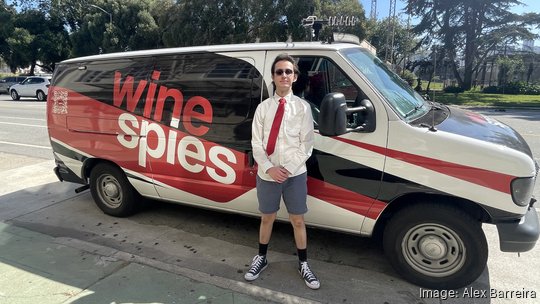
The Bay Area’s latest last-mile delivery startup draws inspiration from ice cream trucks, dim sum cart service, and Airbnb — and it just might make a dent in a space that’s seen many gimmicky pitches and little in the way of long-term sustainability.
Jingle has been in development in Menlo Park since 2021 from Baris Karadogan and Deniz Sozeri, two entrepreneurs who met while working at ghost kitchen operator Reef. It’s discussing its plans publicly for the first time after about a year quietly operating on app stores, with about $2.6 million in seed funding from Bessemer Venture Partners and angel investors in Silicon Valley and Europe.
If you're used to how services like DoorDash, GoPuff or the recently IPO’d Instacart operate — picking up goods from local businesses in response to orders — think of Jingle as doing the opposite. As Karadogan, Jingle's CEO, describes it, rather than “pulling” goods from the store to satisfy a single customer’s order, the platform “pushes” product into neighborhoods in vendors’ vans to drum up demand. It's like a dim sum cart sidling up to a table or a ice cream truck rolling down the street playing a jingle. The latter scenario inspired the startup's name, but in this case, the call to come and get it comes via a smartphone notification.
“Our dream is to turn the Bay Area into one big dim sum restaurant, where foods and services are floating around and you pick the ones that are near,” Karadogan told me. “We want to be the Airbnb for mobile sellers.”
As such, Jingle focuses on vendors with their own delivery trucks, though it operates two of its own vans laden with vendor goods as a “proof of concept” for prospective vendors, Karadogan said. (Another van-based local delivery startup, Feed, originally known as Popcorn, does something similar.)
Karadogan hopes Jingle will become a marketplace that gives vendors an alternative to brick-and-mortar stores in new markets, and a means of discovering new demand. It also promises to help them avoid the high commissions of services like DoorDash, as much as 30%, in favor of a “target rate” of 10% when vendors do their own deliveries, he said. The marketplace strategy means Jingle doesn’t need to maintain its own liquor license: Karadogan said it can advertise liquor on its app since the orders are carried out by licensed vendor partners.
At least for now, Jingle doesn’t sell hot food, instead hawking retail-shelf goods from bakeries (Craftsman and Wolves) and ice cream makers (Humphry Slocombe) as well as selling services from vendors in dog grooming (Van Dogh Grooming) and knife sharpening (Resharp). It could even accommodate, the CEO suggested, mobile massage therapists.
Customers are charged a flat delivery rate of $2.99, which Karadogan believes can work with Jingle's come-and-get-it model.
The bet is that customers will be less picky when presented with a spontaneous find near their door — they might settle for Salt & Straw, even if they love Tin Pot. The vicinity means delivery wait times should be minimal, while vendors can further lower their risk by setting a limited delivery radius that’s profitable for them.
Jingle customers can adjust the notifications for the goods and services they want. When trucks aren’t in the area, customers can signal their future interest with a “request” that might lead to pulling trucks to the neighborhood, if other folks in the vicinity do the same.

One local vendor, Petaluma-based Wine Spies, is looking to expand its market around the Bay Area with Jingle.
Ari Seeber, or "Agent Shiraz" as he's known while making deliveries, typically makes deliveries around the Peninsula where most of Jingle’s early users are based, but made the most of a day in San Francisco with a string of several orders close enough for delivery in about five minutes. (In the Marina, I wasn't as lucky, and had a longer wait when trying out Jingle.)
“With scale we’ll hopefully have that best of both worlds where we’re around frequently and delivery is just a few minutes,” Shiraz told me.
One of Jingle’s biggest challenges may be avoiding notification fatigue among its customers. It aims to tackle this by deploying machine learning against user behavioral data.
Ultimately, Jingle is betting that it can deliver more by promising less with this model, forsaking the pipe dream of “anything you want, cheap in 15 minutes” that proved infeasible for Popcorn, GoPuff, Food Rocket, Farmstead and a raft of other shelf-to-door delivery startups which raised tens of millions in funding during the pandemic but have since upped their fees, scaled back their ambitions or folded entirely in the face of unprofitability.
Popcorn, where Karadogan said he worked for about a month before pursuing what would become Jingle, is a case in point here. It burst onto the scene in 2021, offering a wide selection from its fleet of goods-laden delivery vans. It raised $29 million but eventually rebranded to Feed, targeting larger orders and scheduled deliveries.
Jingle’s CEO acknowledged that “it’s hard to make money on delivering Diet Coke and M&M’s” and that’s a big reason why Jingle is targeting “artisanal” goods and services where bigger margins mean it takes fewer orders to cover costs.
In the distant future, Karadogan said he sees an opportunity for Jingle to help supermarkets eliminate food waste, delivering perishable goods at the edge of their shelf life a last chance to find a way to your fridge.
“If we get to a scale where there are millions of users, then groceries will come up,” Karadogan said.



